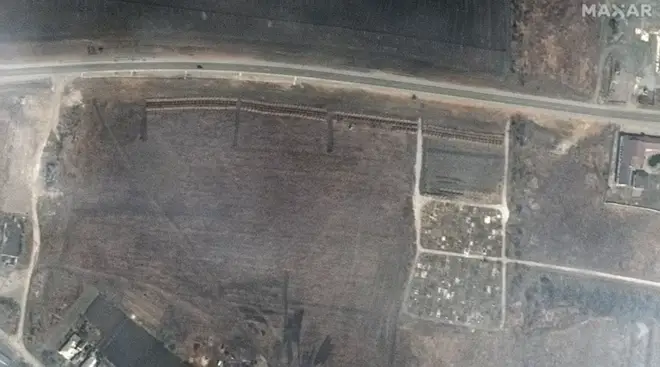
Iain Dale 10am - 1pm
22 April 2022, 08:46 | Updated: 22 April 2022, 08:50

Satellite images show what is feared to be a mass burial site near Mariupol, where local officials accused Russia of burying up to 9,000 Ukrainian civilians to conceal the slaughter taking place in the ruined port city.
The images emerged just hours after Russian President Vladimir Putin claimed victory in the battle for Mariupol, despite the presence of an estimated 2,000 Ukrainian fighters who are still holed up at a giant steel mill.
Putin ordered his troops to seal off the stronghold "so that not even a fly comes through", instead of storming it.
US satellite image provider Maxar Technologies released the photos, which it said showed more than 200 mass graves in a town where Ukrainian officials say the Russians have been burying Mariupol residents killed in the fighting.
Read more: Two Russian oligarchs found dead one day apart alongside their wives and children
Read more: Huge fire at 'top secret' Russian defence HQ leaves five dead and 30 wounded
The images show long rows of graves stretching away from an existing cemetery in the town of Manhush, outside Mariupol.
Mariupol's mayor Vadym Boychenko accused the Russians of "hiding their military crimes" by taking the bodies of civilians from the city and burying them in Manhush.
The graves could hold as many as 9,000 dead, the Mariupol City Council said..
Mr Boychenko labelled Russian actions in the city as "the new Babi Yar", a reference to the site of multiple Nazi massacres in which nearly 34,000 Ukrainian Jews were killed in 1941.
"The bodies of the dead were being brought by the truckload and actually simply being dumped in mounds," an aide to Mr Boychenko, Piotr Andryushchenko, said on the Telegram messaging service.
There was no immediate reaction from the Kremlin. When mass graves and hundreds of dead civilians were discovered in Bucha and other towns around Kyiv after Russian troops retreated three weeks ago, Russian officials denied that their soldiers killed any civilians there and accused Ukraine of staging the atrocities.
In a statement, Maxar said a review of previous images indicates that the graves in Manhush were dug in late March and expanded in recent weeks.
After nearly two months of bombardment that largely reduced Mariupol to a smoking ruin, Russian forces appear to control the rest of the strategic southern city, including its vital but now badly damaged port.
But a few thousand Ukrainian troops, by Moscow's estimate, have stubbornly held out for weeks at the steel factory, despite a pummelling from Russian forces and repeated demands for their surrender.
About 1,000 civilians are also trapped there, according to Ukrainian officials.
Ukrainian officials have repeatedly accused Russia of launching attacks to block civilian evacuations from Mariupol.
At least two Russian attacks on Thursday hit the city of Zaporizhzhia, a waystation for people fleeing Mariupol. No-one was wounded, the regional governor said.
The Red Cross said it had expected to evacuate 1,500 people by bus, but that the Russians allowed only a few dozen to leave and pulled some people off the buses.
Instead of sending troops to finish off the Mariupol defenders inside the steel factory in a potentially bloody frontal assault, Russia apparently intends to maintain the siege and wait for the fighters to surrender when they run out of food or ammunition.
All told, more than 100,000 people were believed trapped with little or no food, water, heat or medicine in Mariupol, which had a pre-war population of about 430,000.
More than 20,000 people have been killed in the siege, according to Ukrainian authorities.
The city has seized worldwide attention as the scene of some of the worst suffering of the war, including deadly air strikes on a maternity hospital and a theatre.
Mr Boychenko rejected any notion that Mariupol had fallen into Russian hands.
"The city was, is and remains Ukrainian," he declared. "Today our brave warriors, our heroes, are defending our city."
The capture of Mariupol would represent the Kremlin's biggest victory yet of the war in Ukraine. It would help Moscow secure more of the coastline, complete a land bridge between Russia and the Crimean Peninsula, which Russia seized in 2014, and free up more forces to join the larger and potentially more consequential battle now under way for Ukraine's eastern industrial heartland, the Donbas.